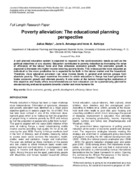Poverty alleviation: the educational planning perspective
| dc.contributor.author | Maiyo, Julius K. | |
| dc.contributor.author | Ashioya, Irene A. | |
| dc.date.accessioned | 2019-05-13T18:24:17Z | |
| dc.date.available | 2019-05-13T18:24:17Z | |
| dc.date.issued | 2009-06-30 | |
| dc.identifier.uri | http://erepository.kibu.ac.ke/handle/123456789/958 | |
| dc.description.abstract | A well planned education system is expected to respond to the socio-economic needs as well as the political objectives of any country. Education contributes to poverty reduction by increasing the value of efficiency of the labour force and thus enhances economic growth. This economic growth is expected to translate into higher income lowering poverty levels. This is because the more educated an individual is; the more productive he is expected to be both in the labour market and the household. Therefore, more education provision can raise income levels in general and remove groups from absolute poverty. This paper examines the extent to which education in Kenya has been planned to foster economic growth and alleviate poverty. It also looks at the factors hindering the realization of this objective and finally offers recommendations on how education can be systematically planned to elevate society and social systems towards a better and more humane life. | en_US |
| dc.language.iso | en | en_US |
| dc.publisher | Academic Journals | en_US |
| dc.rights | Attribution-NonCommercial-ShareAlike 3.0 United States | * |
| dc.rights.uri | http://creativecommons.org/licenses/by-nc-sa/3.0/us/ | * |
| dc.subject | Socio-economic | en_US |
| dc.subject | Poverty | en_US |
| dc.subject | Growth | en_US |
| dc.subject | Development | en_US |
| dc.subject | Efficiency | en_US |
| dc.subject | Labour force | en_US |
| dc.title | Poverty alleviation: the educational planning perspective | en_US |
| dc.type | Article | en_US |

